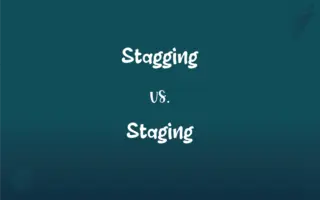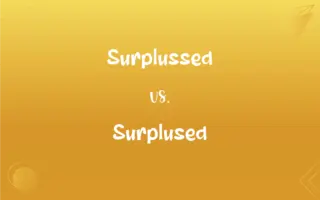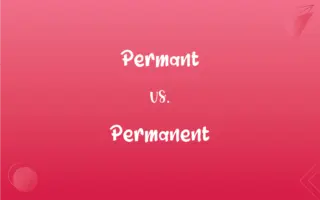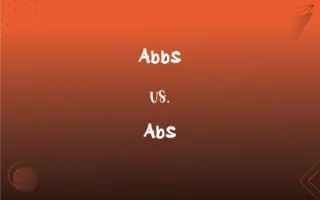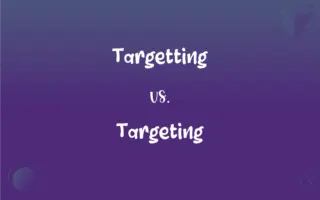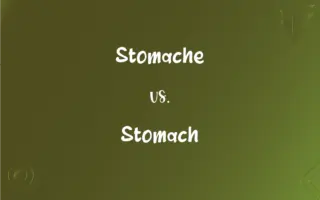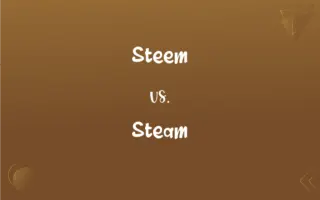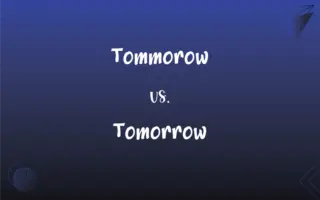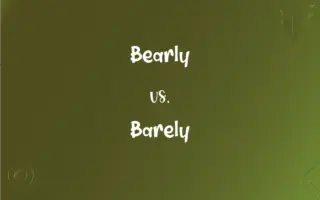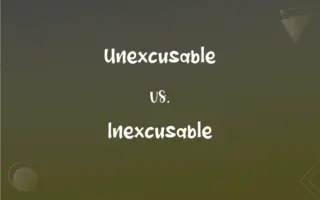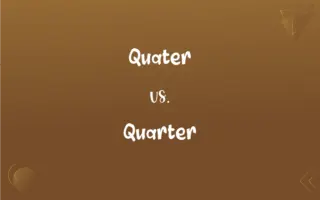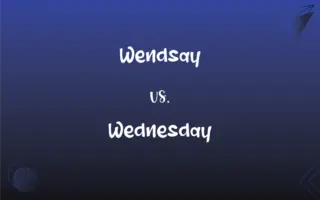Becouse vs. Because: Mastering the Correct Spelling
Edited by Aimie Carlson || By Janet White || Updated on March 12, 2024
The incorrect spelling is "becouse," while the correct spelling is "because." "Because" is a conjunction used to introduce a reason or justification.

Which is correct: Becouse or Because
How to spell Because?

Becouse is Incorrect

Because is Correct
ADVERTISEMENT
Key Differences
Think of "because" as having the word "cause" within it, which hints at its meaning related to reasons.
Notice the word "cause" is part of "because," reinforcing its role in providing justification.
The middle of the word "because" has “au,” which you can remember as "Aha, U (you) found the reason."
"Because" starts with “be,” like many other English words such as "begin" and "believe."
"Because" ends with "se," like "those" or "choose," which are also English words with specific roles in a sentence.
ADVERTISEMENT
Correct usage of Because
He's late becouse his car broke down.
He's late because his car broke down.
She didn't come becouse she was feeling ill.
She didn't come because she was feeling ill.
She's upset becouse she lost her favorite book.
She's upset because she lost her favorite book.
I can't go to the party becouse I have to study.
I can't go to the party because I have to study.
We lost the game becouse we didn't practice enough.
We lost the game because we didn't practice enough.
Because Definitions
"Because" is a conjunction that introduces a reason or explanation.
He left early because he was tired.
In informal language, "because" can introduce not only clauses but also single words.
I did it because science.
"Because" is used in conditional statements to signify a cause-and-effect relationship.
You'll fail because you didn't study.
For the reason that; since.
(archaic) For the reason that.
On account of, for sake of.
My life is ruined because of you!
(by ellipsis) Used alone to refuse to provide a full answer a question begun with "why", usually taken as an anapodoton of the elided full phrase "Because I said so".
By or for the cause that; on this account that; for the reason that.
I hid myself because I was afraid.
As is known, inferred, or determined from the fact that.
It must be broken, because I pressed the button and nothing happened.
I don't think he is a nice person, because he yells at people for no reason.
(obsolete) So that, in order that.
On account of, because of.
He rejected me because revenge, I guess.
It doesn't work because reasons.
In order that; that.
And the multitude rebuked them because they should hold their peace.
Because of these things cometh the wrath of God upon the children of disobedience.
"Because" can also be used to start a sentence when emphasizing the reason.
Because it was raining, we stayed inside.
"Because" can also be part of the phrase "because of," followed by a noun.
We canceled the trip because of the storm.
Because Sentences
Because I woke up late, I missed my bus.
He smiled because he knew the secret.
They're successful because they work hard.
Because she practiced every day, she improved quickly.
He's careful with his spending because he's saving for college.
Because the cake looked delicious, everyone wanted a piece.
She's excited because she's going on vacation soon.
She's happy because she passed her exam.
We're going out to eat because no one feels like cooking tonight.
Because of the rain, the event was postponed.
I'm tired because I didn't sleep well last night.
They're moving because they need more space.
She apologized because she realized she was wrong.
I'm learning to cook because I enjoy trying new foods.
We're happy because we're together.
We chose this location because it's close to everyone.
I'm staying indoors because it's too hot outside.
Because the book was so interesting, she read it in one day.
He's studying hard because he wants to get into a good university.
Because he was honest, he earned their trust.
Because Idioms & Phrases
Just because
For no specific reason; sometimes used to justify an action that might not have a clear rationale.
Just because I felt like doing something nice for you.
Because of you
Indicates that someone's actions have directly led to something happening.
I'm better at this game because of you.
Because I said so
A reason given, often by parents or authority figures, that does not offer any explanation other than their own authority.
You must do your homework because I said so.
All because
Used to highlight the sole or main reason something happened.
We had an amazing day all because the weather was perfect.
Because why not?
A rhetorical question suggesting that there is no good reason not to do something.
Why did I dye my hair blue? Because why not?
Because you never know
Justifies actions as precautions or opportunities because the future is unpredictable.
I always carry an umbrella because you never know when it might rain.
Because who cares?
Indicates a dismissive attitude towards the opinions or judgments of others.
I wore pajamas to the store because who cares?
Because life is short
A justification for doing something that maximizes one's happiness or experiences, underlining the transient nature of life.
I decided to travel now, because life is short.
Because laughter is the best medicine
Suggests that finding humor in life is a way to feel better or cope with difficulties.
We joke around a lot because laughter is the best medicine.
Because the night
Implies actions or feelings are justified or intensified by the nighttime setting.
We danced until dawn because the night inspired us.
Because it's there
A motivation for doing something challenging, often used in the context of mountain climbing or exploring.
Why climb the mountain? Because it's there.
Because tomorrow is another day
Suggests that there is always a future opportunity to try again or improve upon the present.
Don't worry about the failures of today, because tomorrow is another day.
Because reasons
A playful or casual way of saying that there are reasons for something without specifying what those reasons are.
I'm buying another book because reasons.
Because that's how we roll
Explains or justifies behavior as typical or characteristic of a group's way of doing things.
We spontaneously went on a road trip because that's how we roll.
Because every moment counts
Emphasizes the importance of valuing and making the most of every moment.
I live my life to the fullest because every moment counts.
Because kindness matters
Affirms the importance of being kind to others.
I helped a stranger because kindness matters.
Because memories last forever
Highlights the enduring value of experiences and the memories they create.
We take these trips because memories last forever.
Because dreams can come true
Encourages belief in the possibility of achieving one's dreams.
I'm pursuing my passion because dreams can come true.
Because I can
A declaration of one's ability to do something, often used to justify actions that are done for personal satisfaction.
I bought a vintage car because I can.
Because time flies
A reminder to cherish moments or take action because time passes quickly.
Make the most of today, because time flies.
FAQs
Why is it called because?
The term originates from Middle English, combining "by" and "cause," to signify reasoning.
Which preposition is used with because?
"Of" is often used in the phrase "because of."
Which conjunction is used with because?
"Because" itself is a conjunction.
What is the pronunciation of because?
The pronunciation is /bɪˈkɒz/ or /bɪˈkʌz/.
Which vowel is used before because?
Vowels like "a" or "e" can precede "because," depending on the sentence, as in "a reason because" or "simply because."
What is the verb form of because?
"Because" doesn't have a verb form as it is a conjunction.
What is the root word of because?
The root words are Middle English "by" and "cause."
What is the plural form of because?
"Because" does not have a singular or plural form.
Is because a noun or adjective?
"Because" is a conjunction.
Is because a negative or positive word?
It is a neutral word; its connotation depends on context.
Is because a vowel or consonant?
"Because" is a word, not a vowel or consonant.
Is because a countable noun?
"Because" is not a noun, so it's not countable.
Is because an abstract noun?
No, it is not an abstract noun.
How many syllables are in because?
"Because" has two syllables.
What part of speech is because?
"Because" is a conjunction.
What is the opposite of because?
The opposite could be "despite" or "although."
Which determiner is used with because?
Generally, determiners are not used directly with "because."
What is the singular form of because?
"Because" does not have a singular or plural form.
Is because a collective noun?
No, it is not a collective noun.
How do we divide because into syllables?
Be-cause.
Which article is used with because?
No article is commonly used directly with "because."
What is a stressed syllable in because?
The second syllable, "cause," is stressed.
What is the first form of because?
"Because" is a conjunction and does not have different forms.
What is the second form of because?
"Because" does not have multiple forms.
How is because used in a sentence?
"She arrived late because she missed the bus."
Is because an adverb?
No, it is not an adverb.
Is the because term a metaphor?
No, it is not a metaphor.
What is another term for because?
Another term could be "since" or "as."
What is the third form of because?
"Because" does not have multiple forms.
Is the word because imperative?
No, it is not imperative.
About Author
Written by
Janet WhiteJanet White has been an esteemed writer and blogger for Difference Wiki. Holding a Master's degree in Science and Medical Journalism from the prestigious Boston University, she has consistently demonstrated her expertise and passion for her field. When she's not immersed in her work, Janet relishes her time exercising, delving into a good book, and cherishing moments with friends and family.
Edited by
Aimie CarlsonAimie Carlson, holding a master's degree in English literature, is a fervent English language enthusiast. She lends her writing talents to Difference Wiki, a prominent website that specializes in comparisons, offering readers insightful analyses that both captivate and inform.


